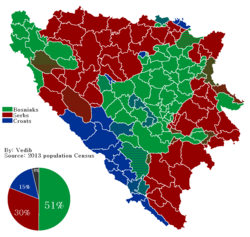
Bosnian surnames carry significant historical and cultural value as they reflect the personal and ancestral backgrounds of individuals. They serve as markers of identity and can provide insights into family history and lineage. The formation of surnames in Bosnia follows common patterns observed in other South Slavic regions, with an emphasis on first names, nicknames, occupations, and geographical locations. Family names are traditionally passed down the male line, and wives typically take their husband’s family name upon marriage. Some may add their husband’s family name to their own. Bosnian given names often reflect their ethnicity. For example, Bosniaks often may have a name with an Islamic or Turkish origin, such as ‘Mustafagić’ (Mustafa).[1]
Bosniak origins

Bosniaks are a South Slavic nation and ethnic group originating from the historical region of Bosnia in southeastern Europe, which is now part of Bosnia and Herzegovina. A significant Bosniak minority resides in other Balkan countries, such as the Sandžak region of Serbia and Montenegro, where Bosniaks form a distinct regional presence. They are also present in Croatia and Kosovo. Bosniaks are commonly identified by their historical ties to the region of Bosnia, their adherence to Islam since the 15th and 16th centuries, and their unique culture and Bosnian language. The Bosnian language is influenced by Slavic, Turkish, and other linguistic elements.
Derivation of bosnian surnames
Suffic -ić
Bosnian surnames often display distinct characteristics that are typical among the South Slavs of former Yugoslavia. A common feature is the use of suffixes like "ić" or "ović" at the end of surnames, which primarily translates to "son" in English. This suffix serves a similar purpose to the "son" found in English surnames like Johnson or Wilson, indicating a family relationship. Understanding the elements preceding these suffixes can provide valuable insights into a specific family's history.
Origin of Bosnian surnames
Patronymics
The majority of Bosnian surnames adhere to a well-established pattern that originated during the period when surnames were standardized in Bosnia and Herzegovina. In certain Bosnian Muslim surnames, the founder's name is followed by an Islamic profession or title, culminating with the suffix "ić". For instance, surnames like Izetbegović (son of Izet bey) and Hadžiosmanović (son of Osman Hadži) exemplify this pattern. Other variations include surnames that solely consist of the given name, such as Osmanović (son of Osman).[2]
Religious affiliation/occupation
There are surnames that denote a specific profession, e.g. Imamović (son of an imam). Some surnames even indicate religious affiliation, such as Muslimović, meaning "son of a Muslim."
The prevalence of the "ović" and "ić" endings commonly associated with Slavic surnames. These surnames likely have remained unchanged since medieval times and are often linked to the old Bosnian nobility or the last wave of individuals who converted to Islam. Examples of such surnames include Tvrtković and Kulenović.
Occupation
There are also Bosnian surnames that deviate from the "ić" pattern. These surnames typically derive from a family's place of origin, occupation, or other significant factors in their history. For instance, surnames like:
Animals
- Another intriguing aspect of Bosnian surnames is their association with animals. Some surnames are derived from the names of local animals, such as:
- Vuk (wolf)
- Medvjed (bear)
- Zec (rabbit)
These animal-based surnames may have historical or symbolic significance, reflecting characteristics attributed to individuals or their ancestral lineages. Occasionally, more unusual animal names, like Majmun (monkey), have also been adopted as surnames, adding diversity and distinctiveness to the naming tradition.[3]
Place of residence
Geographical origins also play a role in surname formation. Families who migrated from one place to another often adopted a surname that indicated their original place of residence. This allowed them to maintain a connection to their ancestral home while distinguishing themselves from the local population in their new location. Thus, surnames like Trebinjac (meaning someone from Trebinje) serve as reminders of familial heritage and migration history.
Foreign origin

Certain Bosnian surnames indicate foreign origins, suggesting that the family's founder came from outside of Bosnia and Herzegovina. These surnames often have Albanian, Turkish, or Arabic roots. Examples include:
- Arnautović (derived from "Arnaute," a Turkish term for Albanians)
- Vlasić (derived from the Vlach people)
- Tatarović (derived from the Tatar people)
- Arapović (derived from "Arap," a Turkish term for Arabs)
Additionally, there are surnames believed to have Proto-Slavic origins, and some may even have Illyrian or Celtic roots, such as the surnames Mataruga and Motoruga. Many Bosnian surnames are also shared by Croatian and Serbian communities, illustrating the interconnectedness and common historical roots of these cultures, such as the following:
These surnames are prevalent across Croatian and Serbian regions.
Most common bosnian surnames
Celebrities with bosnian surnames

- Goran Bregović - Bosnian musician
- Dino Merlin - Bosnian singer
- Franjo AKA "Braco Singer" Klindic Bosnian Bosnian singer
- Eva von Berne Bosnian actress,
See also
Explore more about Bosnian surnames
- Bosnia and Herzegowina family research at MyHeritage record collection.
- Ethnicity map of Bosnia and Herezegowina on the MyHeritage knowledge base.



